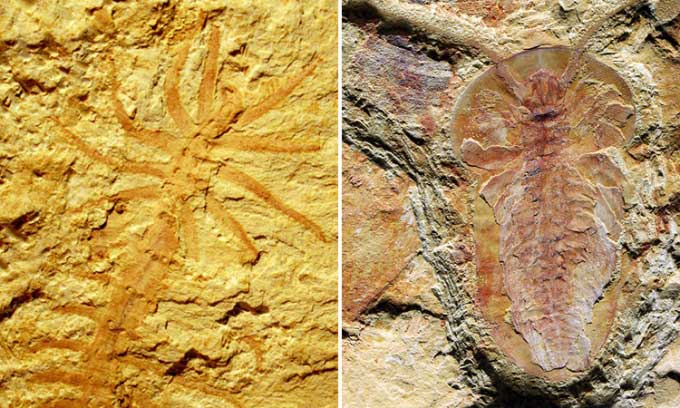The ancestors of many animal species today may have lived in China over 500 million years ago, a new discovery reveals.
One of the oldest collections of animal fossils, comprising over 250 species, has recently been found at the Chengjiang biota in Yunnan Province, southwestern China, according to a study published in the journal Nature Communications on March 23.
The fossils, approximately 518 million years old, belong to various species of worms, arthropods (ancestors of shrimp, insects, spiders, scorpions), and even vertebrates (ancestors of fish, amphibians, reptiles, birds, and mammals). The new findings reveal that Chengjiang was once a nutrient-rich, shallow marine plain that was susceptible to flooding. This area is now located inland in the mountainous region of Yunnan.

Fossils of the worm Luolishania (left) and the arthropod Naroia (right). (Photo: Xiaoya Ma)
“This is an important record of a period known as the Cambrian Explosion, which witnessed a rapid proliferation of bilateral animals, similar to most animal species today, including humans,” the research team emphasized.
Dr. Xiaoya Ma, a paleontologist at the University of Exeter and Yunnan University, the lead author of the study, stated that the discovery of Chengjiang as a plain environment further clarifies the potential causal factors and consequences for the robust development of bilateral animals during the Cambrian period, as well as their remarkable soft tissue preservation.
Environmental stressors in an unstable environment may have contributed to adaptive radiation—the diversification of species from a common ancestor into several lineages to adapt to various ecological niches—of these early animals.

Fossil of the fish Myllokunmingia. (Photo: Xiaoya Ma)
“Our study shows that the Chengjiang biota primarily thrived in a well-oxygenated shallow water plain environment. Flooding transported these organisms to adjacent deep, low-oxygen waters, resulting in the exceptional preservation we see today,” speculated geochemist Changshi Qi from Yunnan University, a co-author of the study.
This new discovery is significant because it indicates that most early animals endured stressful conditions, such as salinity fluctuations and high sediment deposition. This contrasts with previous studies suggesting that similar animals lived in deeper, more stable marine environments.
This research project is an international collaboration involving Yunnan University, the Chinese Academy of Sciences, the University of Exeter, the University of Leicester in the UK, the University of Saskatchewan in Canada, and the University of Lausanne in Switzerland.

















































